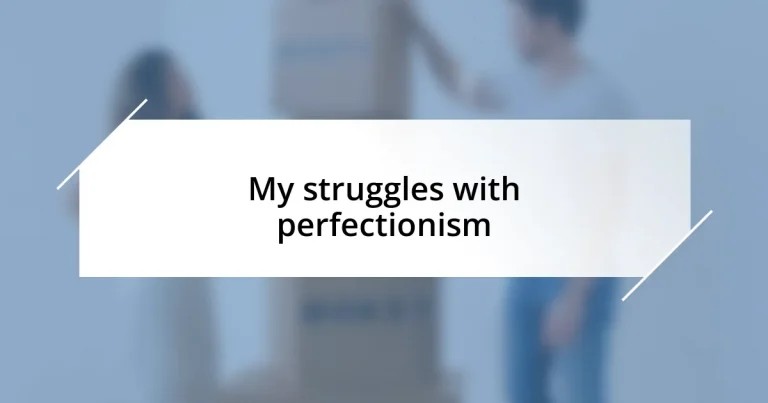Key takeaways:
- Perfectionism is often rooted in childhood experiences and can significantly impact self-worth and creativity.
- Strategies to manage perfectionism include setting realistic goals, reframing thoughts, and sharing struggles with others for support.
- Embracing imperfection can lead to a more authentic life and enhance creativity, as mistakes can transform into valuable experiences.
- Creating a balanced mindset involves mindfulness, celebrating small wins, and limiting comparisons, especially through social media.
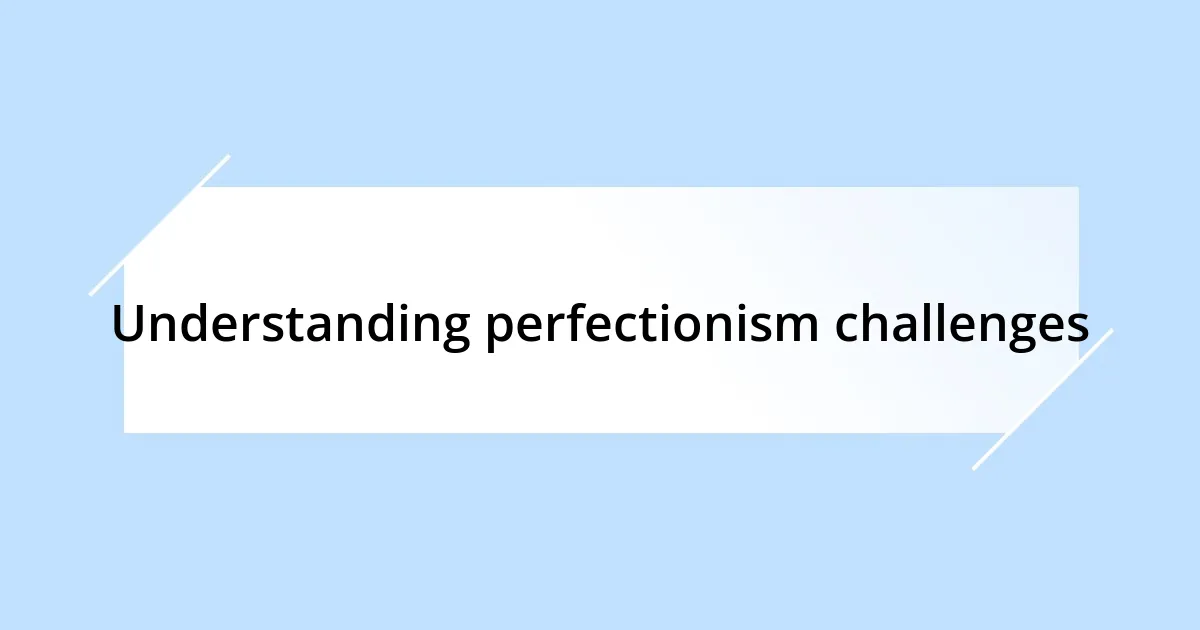
Understanding perfectionism challenges
Perfectionism often creeps in silently, making us feel like we must reach unattainable standards to be validated. I recall a time when I meticulously prepared a presentation, only to feel a wave of dread when it didn’t go exactly as planned. Was my worth tied to that one performance? It’s challenging to navigate, realizing that our self-esteem can hinge on fleeting moments of success or failure.
The emotional toll of perfectionism can be exhausting. I’ve experienced days where I would focus endlessly on a single project, chasing an ideal that kept shifting just out of reach. Have you ever felt like no matter how hard you try, it’s never quite good enough? That inner voice can be relentless, making it hard to enjoy our accomplishments.
It’s interesting to consider how perfectionism can stifle creativity and spontaneity. I remember starting a new art project and finding myself paralyzed by the need for it to be “just right.” I often wonder, what if we embraced the messiness instead? Acknowledging these challenges can be the first step toward a healthier relationship with our own expectations.
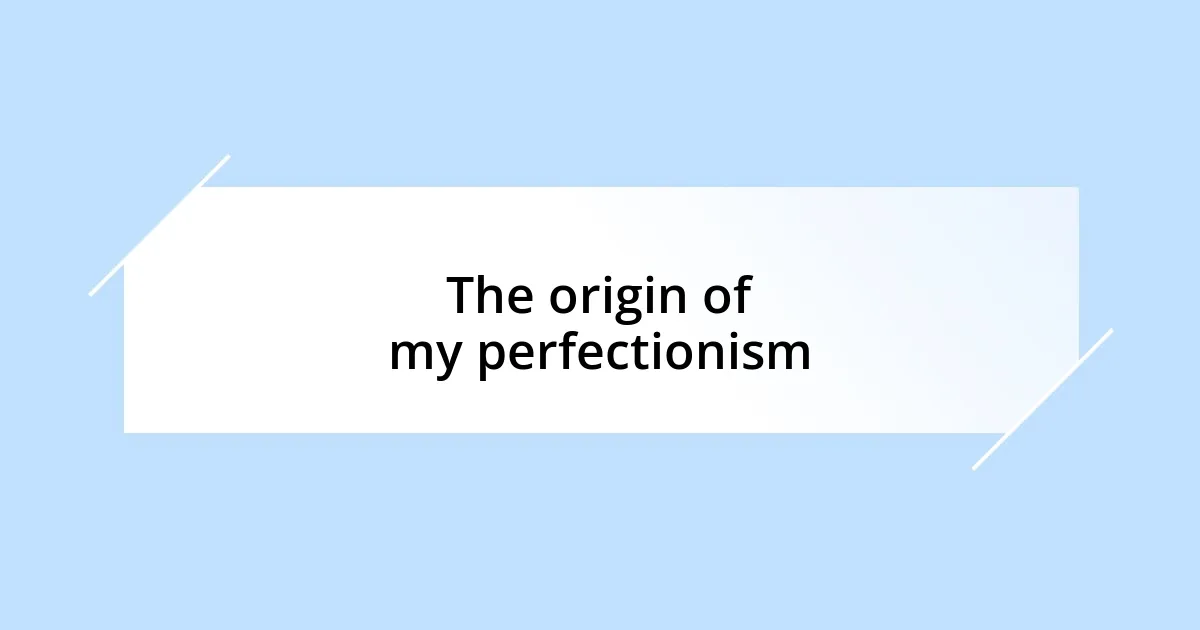
The origin of my perfectionism
Perfectionism often has roots that trace back to childhood experiences. I think back to my early school days when my teachers praised me for high scores, reinforcing the idea that my value was tied to my achievements. That desire for approval became a driving force, weaving itself into my identity.
- I recall the pressure I felt before every exam, needing to outdo myself each time.
- My family held high standards, so I often felt like I was racing to keep up, fearing disappointment.
- There were times I avoided sharing my artwork unless I felt it met my strict criteria, locking away my creativity.
These moments shaped my perception of success and self-worth, creating a cycle that was hard to break.
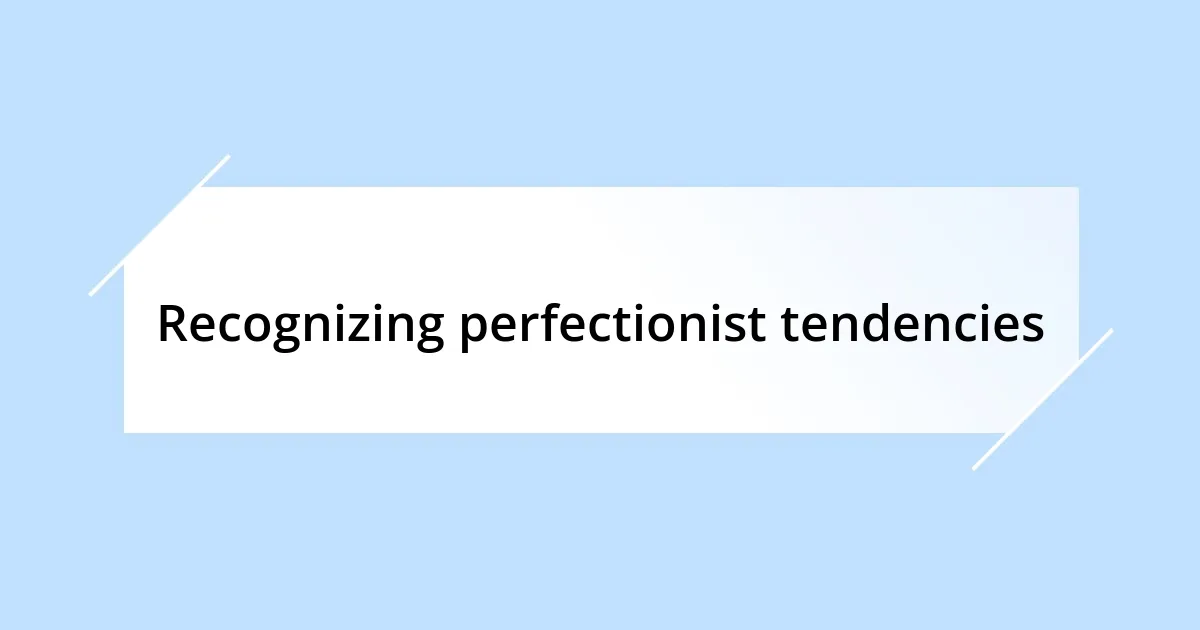
Recognizing perfectionist tendencies
I often notice perfectionism creeping into my daily life in subtle ways. For instance, when I start a new project, I can feel that familiar pressure to make everything flawless from the very beginning. It can feel paralyzing, right? I’ve caught myself redoing a simple task multiple times, all in pursuit of an ideal standard that doesn’t even really exist.
Another sign of my perfectionist tendencies is overthinking decisions. I remember spending hours deliberating over the smallest details of a social media post, worried that every word had to resonate perfectly with my audience. The fear of making mistakes can overshadow the joy of creation, leaving me exhausted and dissatisfied in the end. Does anyone else face this struggle?
It’s vital to recognize these patterns and how they affect not just the quality of our work but our emotional well-being. When I reflect on my constant need for approval, I can see how it affects my interactions with others. I’d often avoid sharing my thoughts or contributions if I felt they weren’t “good enough.” This realization has been a stepping stone toward understanding how these tendencies have limited my sense of self-worth.
| Perfectionist Tendency | Impact on Life |
|---|---|
| Overthinking details | Paralyzes decision-making and affects spontaneity |
| Fear of failure | Prevents sharing of work or ideas, stifling creative expression |
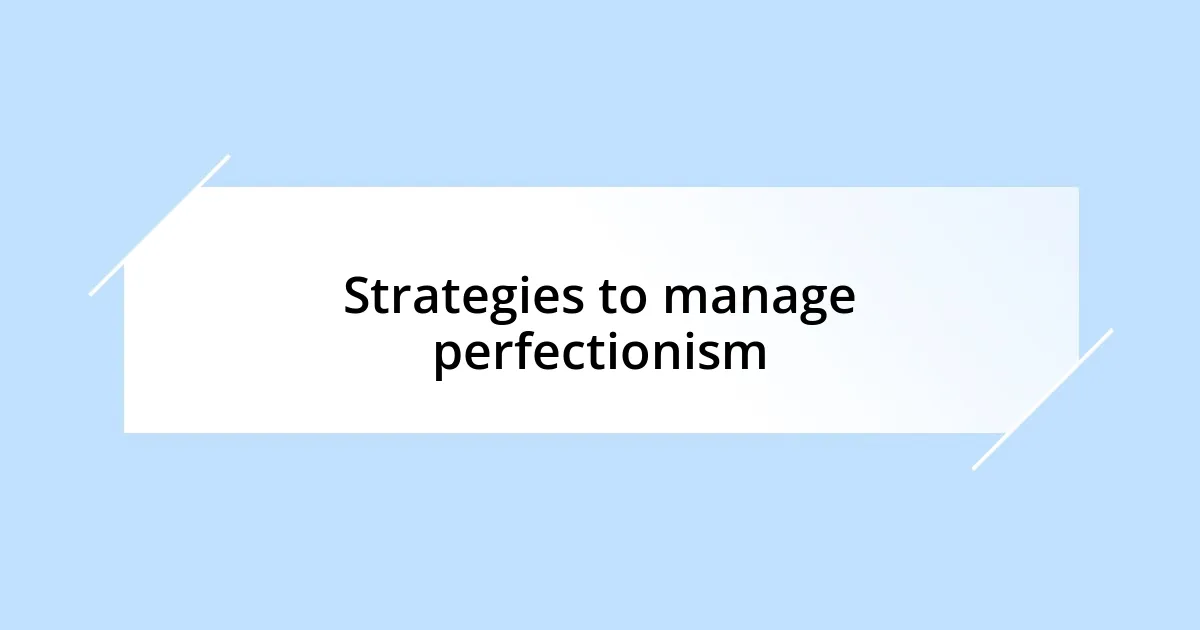
Strategies to manage perfectionism
When I feel perfectionism starting to tighten its grip, one strategy I turn to is setting realistic goals. Instead of aiming for a perfect project, I remind myself that “good enough” can still be valuable. For example, while writing this article, I told myself that if I express my thoughts clearly, the message will resonate, even if it’s not flawless. Have you ever felt that pressure to achieve something unattainable?
Another helpful approach is reframing my thinking. I often catch myself saying, “I must do this perfectly.” But I’ve learned to rephrase that to, “I will do my best and learn from this.” This small shift can ease the overwhelming weight of expectation. I remember a failed presentation that I once dreaded. Instead of feeling crushed, I focused on the lessons learned, and it became a turning point for growth.
Finally, opening up about my struggles has been liberating. I’ve shared my challenges with friends, and their supportive responses helped me realize I’m not alone. Perhaps you’ve hesitated to share your own imperfections? Talking about it not only reduces the burden but also fosters deeper connections with others who might be in the same boat. Together, we can navigate this journey toward acceptance, one imperfect step at a time.
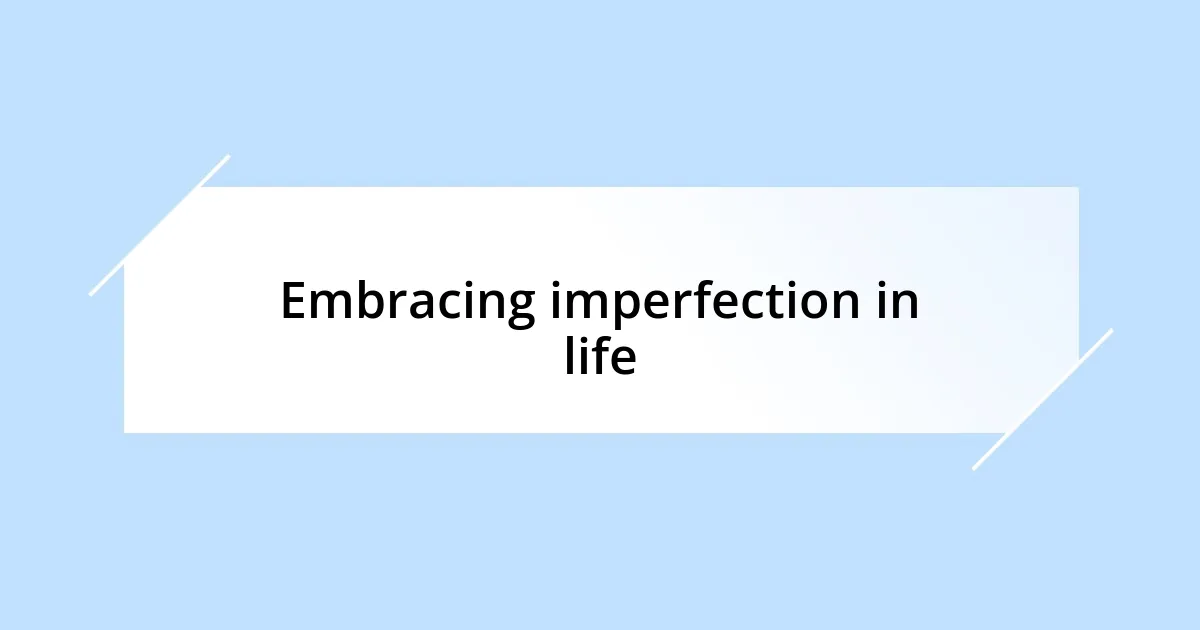
Embracing imperfection in life
Embracing imperfection has been a journey for me. I used to think that every small mistake would define my worth. But then, I started to realize that some of my most memorable experiences came from unexpected missteps. For instance, I once tried cooking a new recipe for a dinner party, and let’s just say the dish didn’t turn out as planned. Despite the initial embarrassment, we ended up laughing about it, creating a much warmer and genuine atmosphere than I could have achieved with a flawless meal.
I find that accepting imperfections allows for a richer, more authentic life. There’s something liberating about letting go of that tight grip on ‘perfect’. I remember a time in my art class when I spilled a splash of paint on my canvas. Instead of panicking, I embraced it. I transformed that error into a highlight, and it led to one of my best pieces. Doesn’t it feel good when we can turn mistakes into beauty?
Living life in a state of perfectionism can rob us of joy and spontaneity. I often ask myself, “What’s the worst that could happen?” Most times, the answer is much less daunting than I imagined. In choosing to see the value in my flaws, I’ve discovered resilience. I encourage you to take a moment and reflect on your own moments of imperfection. How have they shaped who you are today?
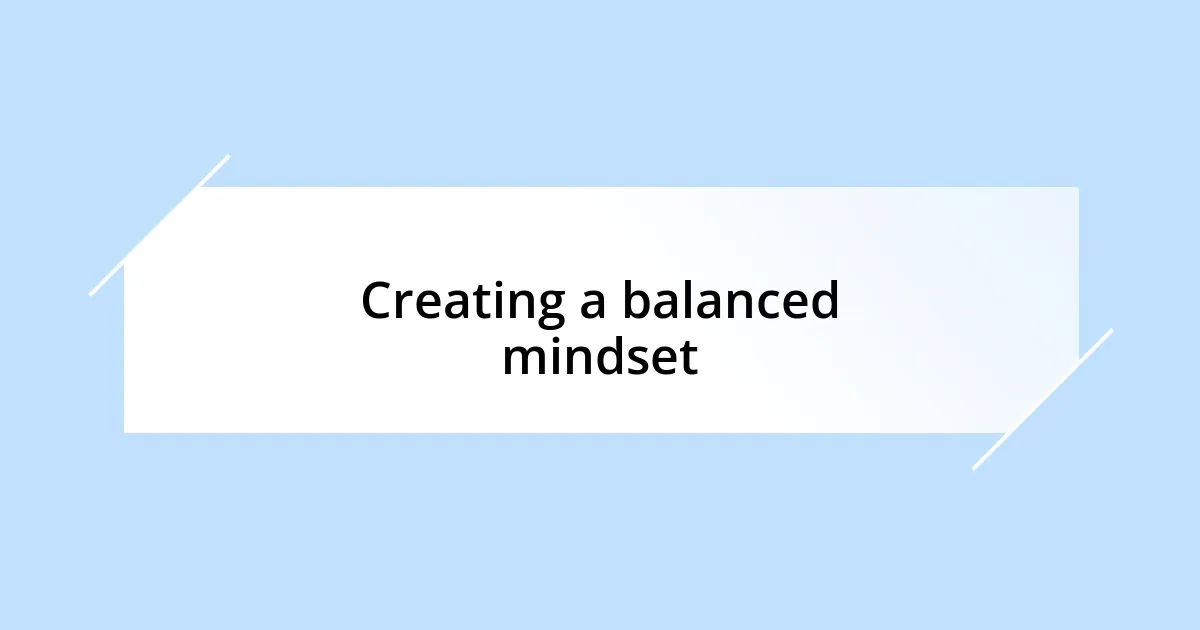
Creating a balanced mindset
Creating a balanced mindset often starts with the simple act of mindfulness. I can’t tell you how many times I’ve caught myself spiraling into a frenzy of self-doubt, thinking my every action should be flawless. But when I pause and take a moment to breathe, I realize that it’s okay to just be human. Have you ever felt that moment of clarity when you let go of the race toward perfection? For me, it’s like flipping a switch; that’s when the real creativity and connection begin.
Another key aspect is learning to celebrate small wins. I remember a time when I completed a project that I had poured my heart into. Instead of focusing on what I could’ve done better, I threw myself a mini celebration for simply finishing it! Those small victories serve as reminders that progress, not perfection, is what truly matters. What if you tried that approach? Acknowledging your efforts, however modest, can significantly shift your perspective and encourage a more balanced outlook.
Lastly, I find it essential to set boundaries around comparison. Social media has a way of amplifying that pesky perfectionist voice. I used to scroll through my feed feeling inadequate, thinking everyone else had it all figured out. By limiting my exposure to certain platforms and curating who I follow, I’ve given myself permission to focus on my own journey. Isn’t it refreshing to celebrate our unique paths rather than comparing our chapters to someone else’s highlight reel? Creating a balanced mindset means reclaiming that space for ourselves.












